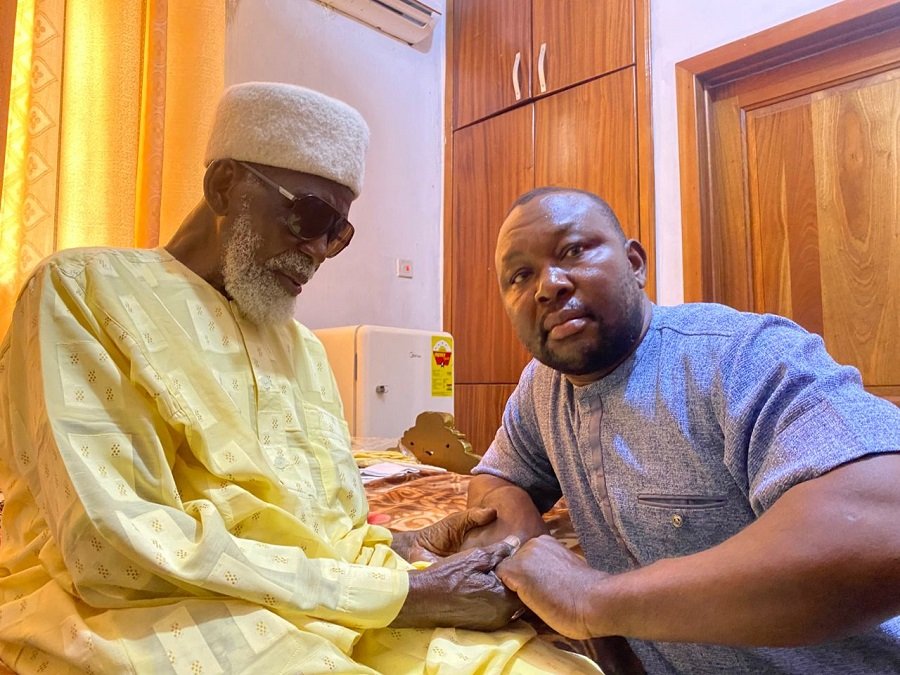Fruitful Living
Do you remember? (Part 1)
“For God did not send His Son into the world to condemn the world, but to save the world through Him.” —John 3:17
INTRODUCTION
This year’s Easter has provided another opportunity for the Christian world to elaborate on the crowning work of our loving Saviour. We spent time to dissect the horrors of the supreme sacrifice that made the positive difference in our eternal destiny. Sermons, songs, and in some cases, the ordinance of foot washing and communion, helped to re-enact the events of the last supper. And once again, we remembered that someone gave His life that we might have everlasting life.
It was a recollection that filled us with dread. For how could a holy God love our sinful human race so much that He put His only begotten Son through that much suffering so that we might be saved? It was also a recollection that filled us with hope. For how could we fear for the future when the crucified Christ rose from the dead and now lives forever?
As the rest of the year stretches ahead of us, if there is one message to keep in mind, it is that Jesus did not die in vain. He died for a purpose, and that purpose extends beyond the Easter holidays. In our key text, we are reminded that He came to save, and not to condemn the world. He has completed His part, and left us to do our part.
As terrible as the pain was, He bore it for our sake. As humiliating and degrading as He was made to feel, He patiently submitted Himself to it all, though He could have called ten thousand angels to slay all those who played principal parts to perpetuate that injustice. He bore it all, so that we can benefit from it. What then are we expected to do in response to such a greatexpression of love?
THE GENERAL RESPONSE
TO CHRIST’S SACRIFICE
We know from Biblical accounts that those who witnessed the crucifixion of Christ did not forget in a hurry. There were those who denied it, knowing in their hearts that they were untrue to compelling evidences and to their own consciences. There were those who had previously doubted, but understood Him clearly only while He was on the cross.
All were touched in irreversible ways. And when Jesus rose again, it was the cue for many to then confess Him as Lord till their last breath.
Jesus did not need to remain physically with them after His resurrection. He had taught them during His three and a half years with them and left them with the Holy Spirit to comfort and guide. His disciples remembered, and the fervor of their witness ignited new generations of other witnesses. They did not just confess Him with their mouths or profess Him merely in their hearts. They did so with their lives. Undaunted by the threat of death, they considered the spilling of their blood a feeble match for the shed blood of God’s Son.
When Peter came face to face with the cross, he saw his unworthiness in stark contrast to the innocence of the One condemned.
When Paul was confronted with the reality of the One who died on the cross, he made a U-turn. Stephen kept his faith to the last, unshaken by the weight of the stones thrown at him, and it did not succeed in shutting out his witness. He breathed his last as a faithful, unrelenting witness of the power of God’s grace. The apostle John died with his belief in the efficacy of the sacrifice of the Son of God.
These men realised how important the issue of salvation is. The recollections of the Roman whip on Jesus’ back, the jeers, and sneers, and shoves—all for a crime He did not commit fired them up. These spoke to them louder and clearer than even Jesus’ words.
Those who were His disciples remembered the times He got hungry and thirsty and tired, all because He wanted to save sinful man. They saw clearly how He went through all of that, by choice, and not because we deserve it.
They remembered how, during the last supper with them, He broke bread and poured wine and commanded them: “Do this in remembrance of me.” As believers, do we remember all these, or have they faded from our memory already, buried under a pile of work and day-to-day concerns?
OUR RESPONSE TO GOD’S LOVE
Remember how on Easter Sunday, we showed up in our Easter clothes and listened with rapt attention to the preacher?
irred deep within us and evoked a commitment to forsake all for the cause of Christ. Just as we were reminded that He died for us, so we are committed to live for Him. Do we still feel the same way today, or have the cares of the week piled on top of the commitment we made? Has it been so long already since that stirring sermon?
Is our life back to the routine of the usual grind? Do we think we can go back to our old way of seeing and doing things? Does Christ’s death and sacrifice impact the choices we make, the friends we keep, how we use our resources, what we eat, and drink, and wear, and how we live our lives?
Do we remember why He died for us? And do we remember that He lives interceding for us so we will not be lost? What has changed about our lives since we pondered the account of Easter this year? Remember, He did not die in vain. Remember, we should not hear the account of His death or profess our belief in His sacrifice in vain. If we recognise that, then we should accept Him as our Lord and Saviour. And if we accept Him as Lord, then we should let Him to have full reign and take charge of our lives.
In closing, Bill Gaither reminds us of our hope as believers in his classic hymn, Because He Lives.
1. God sent His son, they called Him, Jesus; He came to love, heal and forgive;
He lived and died to buy my pardon, An empty grave is there to prove my Saviour lives!
Chorus:
Because He lives, I can face tomorrow, Because He lives, all fear is gone;
Because I know He holds the future, And life is worth the living, Just because He lives!
2. How sweet to hold a newborn baby, And feel the pride and joy he gives;
But greater still the calm assurance: This child can face uncertain days because He Lives!
3. And then one day, I’ll cross the river, I’ll fight life’s final war with pain;
And then, as death gives way to victory, I’ll see the lights of glory and I’ll know He lives!
To be continued!
Stay blessed!
For further inquiries please contact us on Tel Nos. 0243588467 or 0268130615
Email: saltnlightministries@ gmail.com
Website: saltandlightministriesgh.org
By Dr Joyce Aryee, The Author
Fruitful Living
What Will Heaven Be Like?

Heaven is a place of hope
Look! God’s dwelling place is now among the people, and He will dwell with them. They will be His people, and God Himself will be with them and be their God.”
— Revelation 21:3
Introduction
As we journey through life, the thought of a future home with Jesus fills our hearts with peace and anticipation. Heaven is not just an abstract idea or a distant place, but it is God’s promised home for those who believe in Him. Today, we will explore what heaven will be like according to Scripture, how it intersects with the new earth, and why this promise is central to our faith.
1. Heaven: God’s Dwelling Place
Heaven is described as the central dwelling place of God, where He rules the universe from His throne. Although God is omnipresent, heaven is uniquely where His glory is most fully displayed. The Bible promises that when Christians die, they immediately go to heaven to be with Christ (Luke 23:43). However, this is not the final destination. One day, God will bring heaven down to earth, transforming the current heaven into what the Bible calls the “new heaven and new earth.”
This concept is revolutionary. While many imagine that heaven is a place where believers escape the troubles of the earth, the Bible reveals that God’s ultimate plan is to dwell with His people on a renewed earth. As Revelation 21:1 says, “Then I saw ‘a new heaven and a new earth,’ for the first heaven and the first earth had passed away.”
2. Heaven on Earth: The New Creation
God’s plan has always included not only redeeming humanity but also restoring creation. The fall of Adam and Eve affected not only mankind but the entire universe. However, God’s redemption plan extends to all of creation. Isaiah 65:17 promises, “See, I will create new heavens and a new earth.” This new earth will be free from sin, corruption, and death.
The future heaven, or new earth, will be a place where the glory of God is fully revealed. Jesus’ resurrection secured this future, as His victory over sin and death ensures that all of creation will be renewed. It will be a place of perfect fulfillment, joy, and peace—a world where God Himself will walk with His people once more, just as He did in the Garden of Eden.
3. The Throne of God: Reigning with Christ
In the present heaven, God’s throne is the central feature. Yet, when the new earth is created, His throne will be established there. Revelation 22:3 says, “The throne of God and of the Lamb will be in the city.” This means that the new earth will literally be “heaven on earth.”
Believers will reign with Christ in this new creation, reflecting the original purpose for humanity. In Genesis 1:28, God gave Adam and Eve dominion over the earth, and in the new earth, this dominion will be fully realised. Believers will serve God, not in tedious labour but in joyful, meaningful work. The Bible promises that we will reign with Him forever, ruling as His children in a perfect, restored world.
4. The Uniting of Heaven and Earth
A remarkable truth about the new heaven and new earth is that they will not be two separate realms. Instead, they will be united under Christ. Ephesians 1:10 describes God’s plan to “bring unity to all things in heaven and on earth under Christ.” This means that there will no longer be a division between the spiritual and physical realms.
Just as the curtain separating God from humanity was torn when Christ died, the barrier between heaven and earth will be removed in the new creation. The result will be one seamless universe, where God dwells among His people forever.
5. The Wonders of the Holy City: New Jerusalem
The Bible describes the New Jerusalem as a city of unparalleled beauty and glory. Revelation 21:2 reveals that the city will descend from heaven to earth, and it will be the capital of the new earth. This city is described as having gates that are always open and streets of pure gold. Revelation 21:24 says, “The nations will walk by its light, and the kings of the earth will bring their splendour into it.”
This implies that the new earth will have cultures, nations, and rulers—all redeemed and purified. The diversity of people and cultures on the new earth will reflect the creativity of God. All the best aspects of history, culture, and art will be restored and redeemed for God’s glory.
6. Life on the New Earth: Joy and Fulfillment
Life on the new earth will be anything but boring. Some people mistakenly believe that heaven will be a place of endless inactivity, but this is far from the truth. Revelation 22:3 tells us that “His servants will serve Him.” Our work in heaven will be fulfilling and without the curse of sin. We will use our talents and gifts to glorify God in everything we do, and our desires will perfectly align with His will.
The new earth will also be a place of feasting, fellowship, and joy. Matthew 8:11 promises that we will dine with Abraham, Isaac, and Jacob in the kingdom of heaven. The Bible often depicts heaven as a banquet, where we will enjoy food, drink, and celebration with Christ as the guest of honour.
We will also have the opportunity to continue learning, growing, and exploring God’s creation. The wonders of the new earth will be endless, as Ephesians 2:7 says, “in the coming ages He will show the immeasurable riches of His grace.” We will spend eternity discovering new aspects of God’s greatness and beauty.
7. The Restoration of Relationships and Creation
One of the most comforting promises of the new earth is the restoration of relationships. In heaven, all brokenness will be healed. There will be no more pain, sorrow, or death. God will wipe every tear from our eyes, and we will be reunited with loved ones who have also placed their faith in Christ. The relationships we experience in heaven will be free from sin and full of love, as we will know each other fully and perfectly in Christ.
Moreover, the new earth will see the restoration of creation itself. The Bible suggests that even animals will be present on the new earth. Isaiah 65:25 describes a world where “the wolf and the lamb will feed together.” This imagery points to a peace that extends to all of creation.
Conclusion
Heaven, as revealed in Scripture, is not a distant or abstract place. It is our true home, where we will dwell with God forever. The new heaven and new earth will be a place of unimaginable beauty, joy, and fulfillment. As we look forward to this future, we are reminded of God’s incredible love and grace. He desires to be with us, and His plan from the beginning has been to dwell among His people. Let us live in light of this hope, sharing the good news of the gospel and anticipating the day when heaven and earth are united under Christ.
Stay blessed!
For further inquiries please contact us on Tel Nos. 0302-772013 or 0268130615
Email: saltnlightministries@gmail.com
Website: saltandlightgh. org
“
- By Dr Joyce Aryee, the author
Fruitful Living
National Chief Imam blesses Muslim Youth in Agriculture project

The National Chief Imam with Mr Mensah at his residence at Fadama
The National Chief Imam, Sheikh (Dr) Osman Nuhu Sharubutu, has urged Ghanaian Muslims to venture into agriculture in order to enhanced food security in the country.
The Chief Imam said this when the Managing Director of Sky Dolphin Limited, Wisdom Mensah, paid a courtesy call on him at his residence at Fadama, a suburb of Accra on Monday.
Mr Mensah presented a gift to the National Chief Imam in support of his planned anniversary of the birth of Prophet Muhammad (Maulid) which comes off today October 5 at Fadama.
The National Chief Imam asked for Allah’s blessing for the success of the Muslim Youth in Agriculture project.
Mr Mensah is supervising the Muslim Youth in Agriculture project, a partnership between the Muslim community and the Sky Dolphin Limited, which involves novel aquaponics project, a mixture of fish farming and crop farming, aimed at creating jobs for the teeming unemployed Muslim youth as well as vulnerable rural Muslim women.
The representatives of the Islamic Community on the Muslim Youth in Agriculture, aquaponics projects are Sheikh Mustapha Ibrahim, the founder and chairman of the Islamic Council for Development and Humanitarian Services in Ghana (ICODEHS) and Special Advisor to the National Chief Imam, Imam Mohammed Awal Alhassan, the Metropolitan Chief Imam of Takoradi and Greater Accra Chief Imam of the Dagomba Community, Sheikh Yusuf Farouk Alhassan Umar Yussifiya, the Imam of Yussifiya Mosque in Kumasi and Acting Chairman of the National Hilal Committee of Ghana and Alhaji Khuzaima Mohammed Osman, Eminent Member and Chairman of the Greater Accra Regional Peace Council of the National Peace Council of Ghana and Executive Secretary of the Tijjaniya
By Spectator Reporter







